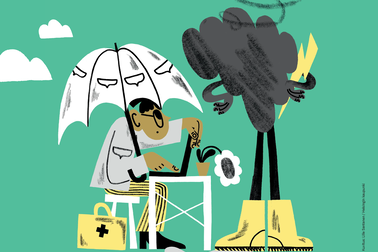
Domestic violence refers to harmful behaviour between people who are who are in a close relationship. It can affect anyone close to you – a child, a relative, a friend or a partner. The violence can be not only physical, but also emotional, financial or sexual. Examples of domestic violence include name-calling, making someone feel guilty and isolation, pushing, hitting or restraining, coercion to sexual acts or harassment, coercive control of clothing or use of money, stalking, threatening and online bullying.
Violence is hidden behind ordinary windows and doors
The Bring violence into daylight campaign is visible on the streets of Helsinki and on social media in November. The windows featured in the campaign highlight a problem that is kept silent and often remains hidden within the walls of homes. When the curtains are closed, the issue is not discussed, no one intervenes and the violence continues. When the lights come on, the truth behind the curtains is revealed and the possibility of help opens up.
“The message of the campaign is aimed at each and every one of us. It is important to broach the subject of violence and intervene in it if you see it happening in your immediate circle, in your neighbourhood or even at work. The victims and perpetrators of the violence may not recognise the problem themselves or seek and receive help,” says Paula Salmi, coordinator of the City of Helsinki’s prevention of domestic violence.
Help is available for both survivors and perpetrators of domestic violence
The shame, guilt and fear felt by both the victims and perpetrators of violence in close relationships may prevent them from seeking help and make them reluctant to talk to outsiders about it. However, outside help is often necessary to break the cycle of violence.
In addition to the City of Helsinki's services, help is also available from the police, the Finnish Institute for Health and Welfare’s Nollalinja and numerous organisations. Crisis support is available around the clock. You can contact helplines and chat services under your own name or anonymously. These services can also be used by loved ones to ask for advice on how to intervene in and broach the subject of violence. Help is available in different languages, either directly or through an interpreter.
The contact details of parties that can help are available on the City of Helsinki’s website at hel.fi/helpforviolence.
In case of emergency, call 112.
Domestic violence affects thousands of people in Finland every year
According to Statistics Finland, a total of 13,000 domestic and intimate partner violence offences were reported to the authorities in Finland in 2024. The number of offences, and violence against women in particular, has increased since the previous year. Women in Finland experience both severe and repeated violence more often than men. The most unsafe place for women is often their own home. In 2024, 74% of the victims of domestic and intimate partner violence aged 18 or more were women, and 75% of the suspected perpetrators were men.
Crime statistics do not give a completely accurate picture of the scale of the problem, as a large portion of violence in close relationship is never reported to authorities. According to a Eurostat survey, more than half (57%) of women living in Finland have experienced physical violence, sexual violence or threats of violence. One in three women have experienced physical or sexual violence or threats of violence in their close relationships. More than half say they have experienced emotional violence or threats of violence in close relationships in their lifetime.
Preventing domestic violence is part of health and welfare promotion
The City of Helsinki plays an important role in promoting the safety of its residents and preventing domestic violence. The eradication of harassment and violence against girls and women and other gender-based forms of harassment and violence has been included as a safety objective in the City’s new strategy.
Key actions in the City's efforts to prevent violence in close relationships include the training of professionals and communication campaigns, which are carried out in cooperation with authorities and organisations. The aim is to identify violence as early as possible in order to reduce human suffering and the social costs of the violence. Preventive work supports safer everyday lives, strengthens wellbeing and promotes equality.
- Services for survivors and perpetrators of domestic violence
- Join the silent candlelight procession on November 25 to end violence against women and girls
- Information about the City's work on preventing domestic violence(Link leads to external service)
- Statistics Finland: Altogether 13,000 domestic and intimate partner violence offences were reported to the authorities in 2024(Link leads to external service)
- Eurostat (2024): EU gender-based violence survey – Key results (pdf)(Link leads to external service)


